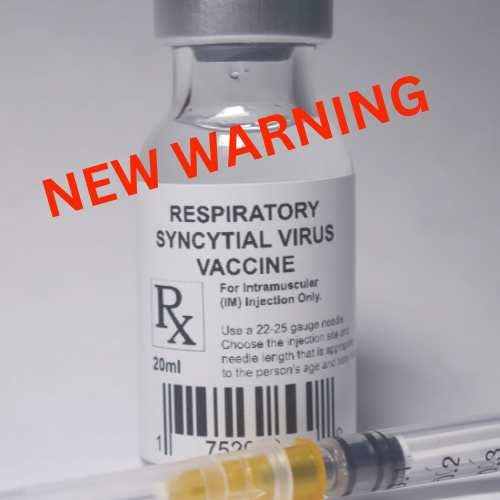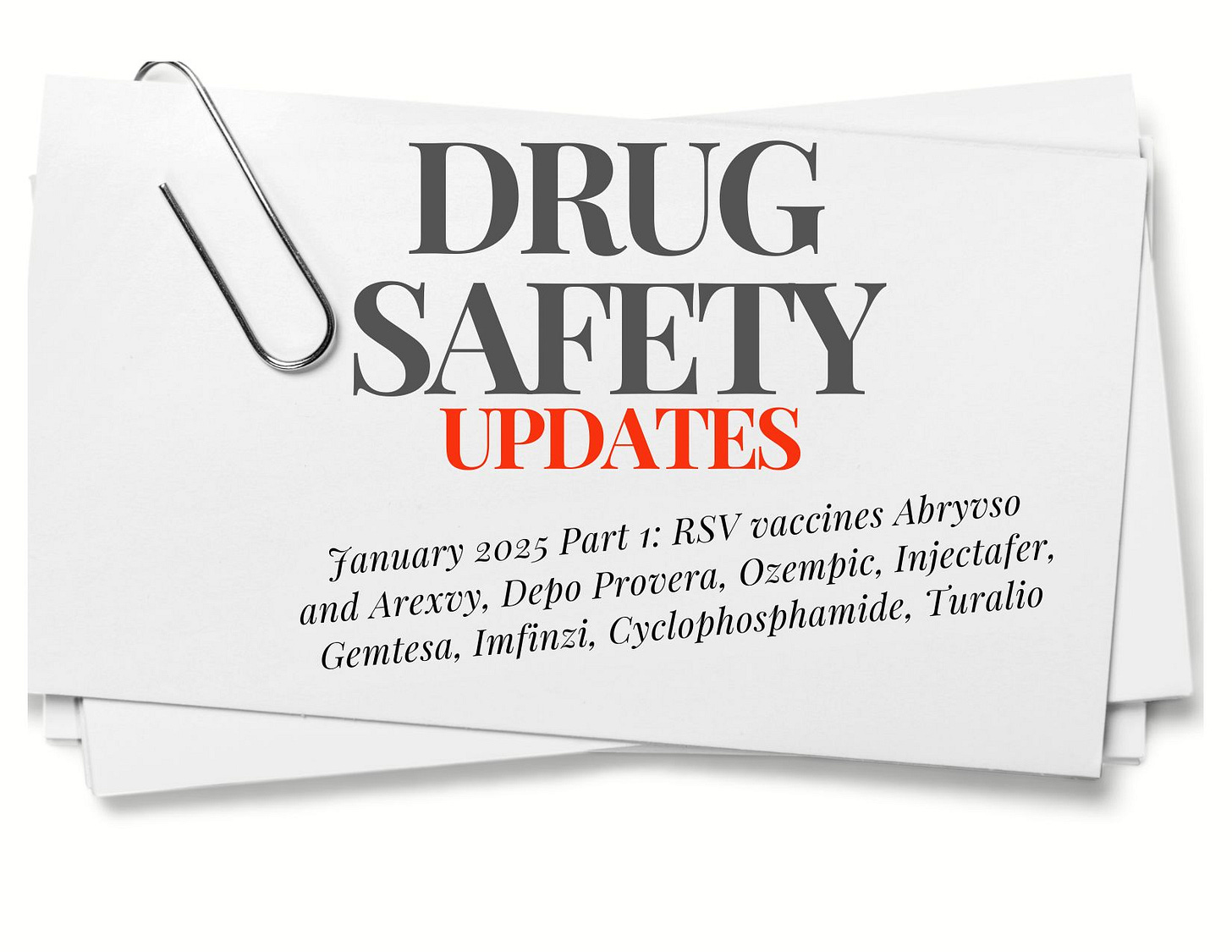January 2025 Part 1: Safety warning for RSV vaccines; Depo Provera contraceptive link to brain tumors; iron infusion therapy risk; Ozempic and rare eye condition; Gemtesa for overactive bladder; more
This week, included are two reports of safety issues (Depo Provera and Ozempic) that did not involve an FDA update but are noteworthy due to lawsuits and European Medicines Agency (EMA) interest.
Abryvso and Arexvy RSV (Respiratory Syncytial Virus) Vaccines
RSV vaccines Abrysvo and Arexy have new a warning about the risk of developing Guillan-Barré syndrome (GBS), an autoimmune condition. Observational studies suggest a higher incidence of GBS within 42 days after vaccination. GBS is a rare disorder in which the body’s immune system damages nerve cells, causing muscle weakness and sometimes paralysis. Healthcare providers are advised to monitor patients for signs of GBS following vaccination.
FDA Safety Announcement on RSV Vaccines
Have you taken Abryvso or Arexvy? Add your rating: Abryvso Patient Ratings and Arexvy Patient Ratings
Read more about Guillan-Barré syndrome at Medline Plus.
Depo-subQ Provera 104 (medroxyprogesterone acetate) subcutaneous injection
Depo-subQ Provera is injected every three months to prevent pregnancy or to manage endometriosis-associated pain. Endometriosis occurs when cells from the lining of the uterus grow in other parts of the body. This medication is usually administered by a health care professional. The label was updated to warn about the risk of skin discoloration at the injection site. Another version of the drug, Depo Provera, was approved in 1992 and is still in use. Unlike Dep-subQ, it is administered as an intra-muscular shot. It is recommended that the drugs not be used longer than two years. Depo-subQ Provera 104 was approved in 2004, although the active ingredient was originally approved in 1959.
Depo SubQ Provera 104 FDA Label Update
Injectable medroxyprogesterone (both Depo Provera products) Linked to Brain Tumor Risk
Recent studies have shown that medroxyprogesterone acetate injection is associated with a significantly increased risk of developing cerebral meningioma, a type of brain tumor. Although the tumors are usually benign, they can cause seizures, headaches, vision loss, and death. A lawsuit filed in November 2024 by a 49-year old Nevada mom who took the drug for years alleges that "Pfizer, and other manufacturing companies who make authorized generic versions of Depo-Provera, was aware of the possibility the shot could lead to meningiomas, a type of tumor on the membranes that surround the brain." Patients taking Depo Provera-Q may also be included in upcoming lawsuits. In Europe, the meningioma risk associated with injectable medroxyprogesterone acetate was announced in a December 2024 professional communication through the European Medicines Agency (the E.U. equivalent to the U.S. FDA).
EU Safety Communication for Medroxyprogesterone
More on the lawsuit over medroxyprogesterone
Study in the British Medical Journal (BMJ)
Gemtesa (vibegron) tablets
Gemtesa (vibegron) treats overactive bladder (OAB) with symptoms of urge urinary incontinence, urgency, and urinary frequency in adults. Recently, it gained approval as a treatment for overactive bladder in adult males with benign prostatic hyperplasia (also called enlarged prostate or BPH). The label includes new warnings about the risk of angioedema (swelling) to the face, lips, tongue, throat, and other hypersensitivity reactions. Clinical trials results are added that indicate no differences in drug safety for patients age 65 and older compared with younger patients. Gemtesa was initially approved in 2020.
Gemtesa FDA Safety Label Change
Injectafer (ferric carboxymaltose) intravenous infusion
Injectafer infusion therapy is used in adults and children (over age one) with severe iron deficiency anemia who have not responded to orally administered iron or who don’t tolerate oral iron medications. Injectafer is also approved to treat iron deficiency in adults with mild to moderate heart failure to improve the ability to exercise.
The label was updated to warn about the potentially life-threatening risk of symptomatic hypophosphatemia (a severe reduction in phosphate in the blood). Possible risk factors for hypophosphatemia include a history of gastrointestinal disorders associated with malabsorption of fat-soluble vitamins or phosphate, inflammatory bowel disease, concurrent or prior use of medications that affect kidneys, hyperparathyroidism, vitamin D deficiency, malnutrition, and hereditary hemorrhagic telangiectasia (HHT or Osler-Weber-Rendu syndrome). Injectafer was initially approved in 2013.
Injectafer FDA Safety Label Change
Read or add patient reviews for Injectafer
Read more about hypophosphatemia at Medline Plus. Symptoms of hypophosphatemia can include bone pain, confusion, muscle weakness, seizures.
Semaglutide (Ozempic and Wegovy) and Eye Condition Risk
A rare but serious eye condition called non-arteritic anterior ischemic optic neuropathy (NAION) has been linked to the GLP-1 drug semaglutide (active ingredient in Ozempic and Wegovy). The condition, which may result in blindness, happens when blood flow is interrupted to the optic nerve. The European Medicines Agency (EMA) announced it is reviewing two Danish studies that suggest a link. The U.S. FDA has not yet recognized or commented on this potential problem.
Opthalmology Times: European Medicines Agency to Assess Semaglutide for Link to NAION
Reuters article on semaglutide and NAION
Pyrukynd (mitapivat sulfate) tablets
Pyrukynd treats adults with hemolytic anemia caused by PK (pyruvate kinase) deficiency, a rare type of inherited blood disorder that causes chronic hemolytic anemia. Without enough of the enzyme pyruvate kinase, red blood cells break down too easily, resulting in a low level of red blood cells (hemolytic anemia).
The revised label provides new safety information about the risk of liver injury in adult patients with other conditions (such as thalassemia). Mitapivat is now under FDA review as a potential treatment for thalassemia. Thalassemia is an inherited blood disorder that causes anemia, and is not the same condition as the inherited blood disorder PK deficiency. Pyrukynd was initially approved in 2022.
Pyrukynd FDA Safety Label Change
Read more about PK deficiency at Medline Plus.
Treatments for Cancer or Related Conditions
Cyclophosphamide intravenous infusion
Cyclophosphamide injection is a chemotherapy drug often used in conjunction with other medications to treat many types of cancer in adults. Its label was updated to add potential interactions with radiation therapies. For patients also receiving radiation treatments, reactions can include immunosuppression, kidney damage, liver toxicity, and cardio toxicity. Cyclophosphamide was initially approved in 1959.
Cyclophosphamide FDA Safety Label Change
Read or add patient reviews for cyclophosphamide (Cytoxan brand name).
Imfinzi (durvalumab) intravenous infusion
Imfinzi is an immunotherapy that treats different kinds of cancer, including NSCLC (non-small cell lung cancer), small cell lung cancer (SCLC), liver cancer and endometrial cancer. The label update contains clinical trials results to support its expanded approval for treating limited stage small cell lung cancer (LS-SCLC). The immune-mediated adverse reaction of pneumonitis (inflamed lungs) occurred during clinical trials. Read label for complete trial updates. Adds that the most common side effects when used for LS-SCLC are inflammation in the lungs and feeling tired or weak.
FDA issued a press release about Imfinzi's approval for limited-stage small cell lung cancer whose disease has not progressed following concurrent platinum-based chemotherapy and radiation therapy. This is the first immunotherapy approved for LS-SCLC. Imfinizi was approved in 2017.
Imfinzi FDA Safety Label Change
Turalio (pexidartinib hydrochloride) capsules
Turalio treats tenosynovial giant cell tumors (TGCTs), a rare type of tumor that affects the joints. Although these tumors are usually not cancerous, they can sometimes grow and cause damage to the joints and tissues around them. In very rare cases, TGCTs can transform into cancerous (malignant) tumors. Its boxed warning was updated to warn about the risk of serious liver toxicity, including “vanishing bile duct syndrome.” Turalio was initially approved in 2019.
Turalio FDA Safety Label Change
Read more about TGCTs at the National Organization for Rare Disorders.
Thank you for reading this edition of Drug Safety Updates. Did you miss the December 29 edition? Check it out here:
Please visit us at Ask a Patient for more information on health and drugs. We provide a simple rating form for you to quickly add your own experience (or even just assign a rating score) for many medications and vaccines.



